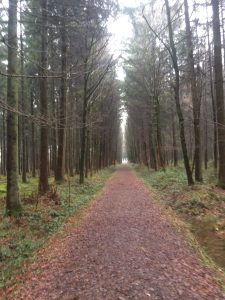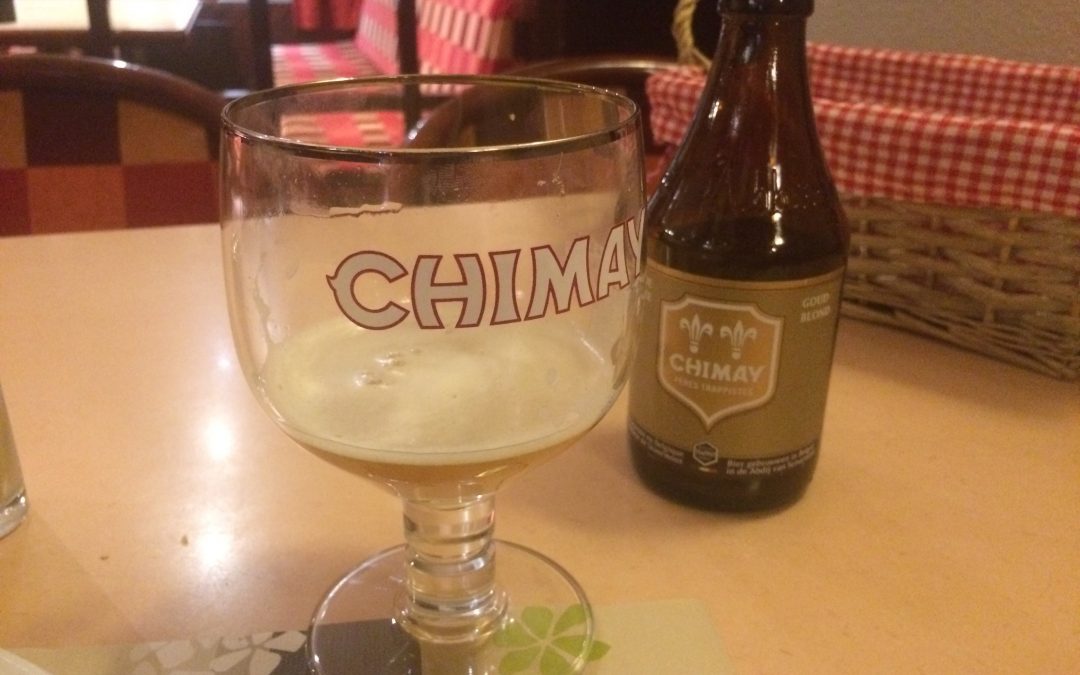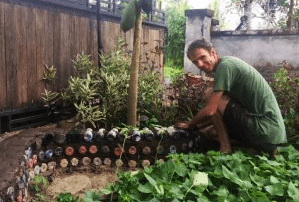Folks, I’d like to take a moment and tell you about the best beer, hands down, that I know of in the world.
It’s true, I am a bit biased: the monks at the abbey where it is brewed took me in during a snow storm as I tried to bike through the European winter. Trust me though– it is Good stuff. Yes, with a capital G. You see, over the last ten years, I’ve gotten to know the monks and the story behind the amazing Chimay beer.
This past week, I’ve had the great pleasure of returning to this small monastery in Belgium, and visit one of the monks who I got to know during that fateful winter of 2009. Back then, I was passing through Europe with only my bike and camping gear on a trans-continental cycle journey. I had been told about the monastery; that they accepted guests, especially those on foot or bike. Just as I arrived at the Abbey de Scourmont, a snow storm struck. Frère Jaques, in charge of hosting, insisted I stay until the snow melted. In the end, I stayed for about three weeks (what can I say, I had a warm bed, three meals a day, and beer for lunch and dinner!). Frère Jaques and I got to know each other on long walks through the white fields and forests surrounding the monastery. During this time, I began to hear the stories about the Chimay brewery and see for myself where the famous beer is made.
 Frère Jaques is now 87 and going strong. He still walks for an hour and half every day regardless of the weather! Frère Jaques has been a part of the Community since his early 20’s. We went for our walks, just like old times. He still remembers and tells stories about the Armé Blanche, the Belgian resistance, which fought back under cover against the Germans in WWII. He also remembers the various monks who played a role in crafting the Chimay beer. Indeed, over the last decades he has personally taken care of the forest and cut channels that protect the sacred spring that flows to the brewery.
Frère Jaques is now 87 and going strong. He still walks for an hour and half every day regardless of the weather! Frère Jaques has been a part of the Community since his early 20’s. We went for our walks, just like old times. He still remembers and tells stories about the Armé Blanche, the Belgian resistance, which fought back under cover against the Germans in WWII. He also remembers the various monks who played a role in crafting the Chimay beer. Indeed, over the last decades he has personally taken care of the forest and cut channels that protect the sacred spring that flows to the brewery.
The monks have been producing beer from this crystal clear spring and with local barley since 1862. It began just for the consumption of the brothers, then for the local Chimay community. As manual labour is an important part of the Benedictan Rule that the Trapists follow, the brothers were always working the land. On my walks with Frère Jaques, he showed me the stones chapels he had built, forests they had once cut, and forest they had planted. Frère Jaques explained that after a hard day of work in the forest that a good thick beer, full of calories and flavour was just what was needed.
In the early 60’s however, the Abbot decided that there was enough interest in the beer to begin selling it nationally. He picked out one of the Brothers for the task. Frere Jorges, was a brilliant scholar at the time. Upon the request, (the monks also have Obedience as part of their rules) he switched his entire life focus from theology to beer brewing! Over the next twenty years, he applied his intellect to mastering the art, science and chemistry of beer, first perfecting the recipe for their blonde beer, then overseeing the building of a massive production facility. Next he mastered the recipes for their double and triple beers. Frère Jorges may never have achieved great scholastic renown, but his legacy and accomplishments are profound.
When I was last at the monastery, ten years ago, I was wandering the halls looking for a room to do some laptop work in. By accident I walked into a meeting with the abbot and a half dozen men in suits. I discovered later that the monks don’t go to the bank, the bankers come to them! Their operation is now in the tens of millions of euros. Their vast brewing facility is quite the place– a full out international calibre facility that can process thousands of bottles a day. The monks once helped out with elements of the operation (Pere Jaque remembers bottling the beer), but as the production has grown and diversified, now they hire engineers, specialists and local labour to run production and manage the business. Indeed, the brewery is one of the biggest contributors to the economy of this rather depressed and rural part of Belgium. Now Chimay beer, has a massive international export operation. Though hard to find, the connoisseur can track it down just about anywhere in the world.
I also learned from Frere Jaques and a Congolese sister, where the revenue goes. They say nothing of it on the bottle– but the revenue from the beer supports deep charities around the world. In contrast to the big beer corporate companies in my country, rather than funding rock concerts or sponsoring sports teams, Chimay profits go to support dozens of orphanages and schools around the world, in particular in the Congo where they work against the odds in conflict ridden areas (I met one of the teachers who taught beside daily urban gun battles). They have also founded other Trappists monasteries. These monasteries assist the struggling Congolese national education system.
And their beer helps the brothers continue with their own live work at the Abbey de Scourmont. I may not be Catholic, but I have a deep respect for the existential ripples that emanate out the monastery and the profound commitment to prayer and peace of the monks. People come from all over for retreats– then leave refreshed (like me). One visitor described it “the Community is of immeasurable value for our region. It is an island of peace that we all gain from”. Meanwhile, the brothers continue their lives dedicated to prayer and service– which also has mysterious yet palpable energetic effect. It has been an honour to witness first hand its slow and quiet power– both locally and globally.
In a world where so many NGOs and corporations brag about their good deeds you gotta admire the quiet, deep authenticity of these guys, their charity, and their craft. The only reason you are finding out about it is because you know someone who, over extraordinary circumstances, got to know one of the monks and hear their story first hand.
Chimay beer, as far as I can see, has virtually zero advertising budget. In contrast to those big beer companies that need to spend millions of dollars on marketing to convince you to drink their brand, Chimay quietly lets it’s product do the talking. Indeed they need no marketing. The beer is really so good that it speaks for itself.
The Chimay blonde accompanies lunch and dinner. The Chimay Red is for festive occasions. The Chimay blue is reserved for special moments of existential pain and/or pleasure.
And it is Good stuff.



